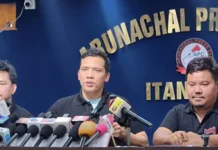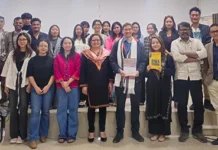ZIRO, Jul 25: A three-day state level review meeting on the National Vector Borne Disease Control Programme (NVBDCP) began here in Lower Subansiri district on Thursday.
Addressing the participants, Guwahati (Assam)-based Health & Family Welfare Regional Director Dr Partha Jyoti Gogoi stressed on the need for concerted efforts from all stakeholders, including ASHAs, MPWs, anganwadi workers and the medical fraternity, to contain and eradicate vector-borne diseases.
“To prevent vector-borne diseases, the medical infrastructures should be strengthened, manpower, especially the lab technicians, should be adequately trained, and massive awareness and IEC activities should be taken up,” he said, adding that early detection, followed by prompt and complete treatment would go a long way in controlling vector-borne diseases.
“Non-performing MPWs and MTS and other paramedical staffs should be reprimanded and notified to the higher authorities for further course of action,” Dr Gogoi said, and asked the DPOs of the NHM and all vertical programmes to report such cases.
Family Welfare Director Dr Alok Yirang made a PowerPoint presentation on the various programmes under the NVBDCP.
Summing up the annual parasite incidence report of the state, he informed that “the average of the entire state is below two, which is a good indicator.”
He said malaria positive cases have gone down from 6080 in 2014 to 108 cases in 2019 (till June), with no malarial deaths since 2017.
Dr Yirang also informed that the state government has targeted eliminating malaria by 2025, five years ahead of the national target.
“Coordination, along with API-wise stratification of every village and sub-centre, early diagnosis, investigation, follow-up and complete treatment is the key to eradicate vector-borne disease,” he said.
The director said a rapid action task force is in place and malaria elimination task forces have been constituted at the state, district and block levels to tackle endemic scenarios and eradicate vector-borne diseases.
“These task forces are inter-sectoral, since malaria cannot be eliminated by a single department. Besides a strong political will, absolute coordination between all the stakeholder departments is necessary,” he added.
In the matter of Japanese encephalitis, Dr Yirang informed that 44 cases have been reported so far in the state – 38 cases from East Siang, “two cross-reports from Meghalaya, and one case from Assam.”
He said information about precautionary measures has been widely circulated and directives issued to all the DCs and DMOs to create awareness about the disease in the districts.
The district project officers made PowerPoint presentations on the status of the NVBDCP and other activities initiated in the districts. They also highlighted the issues faced in implementing the programme at the grassroots level.
Lower Subansiri DC Chukhu Takar expressed hope that such meetings would motivate young doctors and other paramedical staffs to improve the state’s health indicators.
The first day’s meeting was also attended by DMO Dr Tage Kanno, NVBDCP state consultants, DPOs and consultants of all the districts. (DIPRO)





